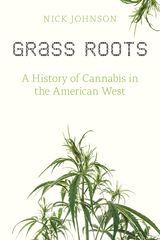4 books about Cannabis

The African Roots of Marijuana
Chris S. Duvall
Duke University Press, 2019
After arriving from South Asia approximately a thousand years ago, cannabis quickly spread throughout the African continent. European accounts of cannabis in Africa—often fictionalized and reliant upon racial stereotypes—shaped widespread myths about the plant and were used to depict the continent as a cultural backwater and Africans as predisposed to drug use. These myths continue to influence contemporary thinking about cannabis. In The African Roots of Marijuana, Chris S. Duvall corrects common misconceptions while providing an authoritative history of cannabis as it flowed into, throughout, and out of Africa. Duvall shows how preexisting smoking cultures in Africa transformed the plant into a fast-acting and easily dosed drug and how it later became linked with global capitalism and the slave trade. People often used cannabis to cope with oppressive working conditions under colonialism, as a recreational drug, and in religious and political movements. This expansive look at Africa's importance to the development of human knowledge about marijuana will challenge everything readers thought they knew about one of the world's most ubiquitous plants.
[more]

Cannabis Consulting
Helping Patients, Parents, and Practitioners Understand Medical Marijuana
Ezra Parzybok
University Press of New England, 2018
As the movement for legalization of marijuana spreads across the country, it is important to weigh the possible benefits and pitfalls of cannabis use. Cannabis Consulting is both a handbook and a report from the front lines of medical marijuana use. Writing from the perspective of a parent and veteran schoolteacher turned professional cannabis consultant, Ezra Parzybok tells the often-inspiring stories of his practice, where he assists victims of chronic pain, terminal disease, and even conditions such as ADHD. This timely volume was written for patients and families, law enforcement and health professionals, who are trying to make decisions about cannabis during this critical era of transition. It is an honest, clear-eyed exploration of the marijuana debate that looks beyond the hype and disinformation on both sides to chart a new path toward rational and safe use of cannabis.
[more]

Cannabis in Arabic Verse and Prose
Adam Bremer-McCollum
Harvard University Press
From the thirteenth to the fifteenth centuries, a number of historians, jurists, poets, and others writing in Arabic turned their attention to a newly arrived plant, Cannabis indica, noting its psychoactive powers and how it first spread among Sufis. They discuss cannabis’s origins, who uses it and how, and whether or not it should be used. These works range from historical narratives to anecdotal, sometimes humorous, stories to legal remarks, all buttressed by quotations from poetry. Cannabis in Arabic Verse and Prose also includes a famous section from historian al-Maqrīzī’s (1364–1442) influential work on Egypt, excerpts from treatises by lesser-known writers, and the most important text on the subject from this time period by poet al-Badrī (1443–1489). This edition presents the Arabic texts with facing English translations, an Arabic-English glossary, and commentary.
[more]

Grass Roots
A History of Cannabis in the American West
Nick Johnson
Oregon State University Press, 2017
Marijuana legalization is unfolding across the American West, but cultivation of the cannabis plant is anything but green. Unregulated outdoor grows are polluting ecosystems, high-powered indoor grows are churning out an excessive carbon footprint, and the controversial crop is becoming an agricultural boon just as the region faces an unprecedented water crisis.
To understand how we got here and how the legal cannabis industry might become more environmentally sustainable, Grass Roots looks at the history of marijuana growing in the American West, from early Mexican American growers on sugar beet farms to today’s sophisticated greenhouse gardens. Over the past eighty years, federal marijuana prohibition has had a multitude of consequences, but one of the most important is also one of the most overlooked—environmental degradation. Grass Roots argues that the most environmentally negligent farming practices—such as indoor growing—were borne out of prohibition. Now those same practices are continuing under legalization.
Grass Roots uses the history of cannabis as a crop to make sense of its regulation in the present, highlighting current efforts to make the marijuana industry more sustainable. In exploring the agricultural history of cannabis, There are many social and political histories of cannabis, but in considering cannabis as a plant rather than as a drug, Grass Roots offers the only agriculturally focused history to date.
To understand how we got here and how the legal cannabis industry might become more environmentally sustainable, Grass Roots looks at the history of marijuana growing in the American West, from early Mexican American growers on sugar beet farms to today’s sophisticated greenhouse gardens. Over the past eighty years, federal marijuana prohibition has had a multitude of consequences, but one of the most important is also one of the most overlooked—environmental degradation. Grass Roots argues that the most environmentally negligent farming practices—such as indoor growing—were borne out of prohibition. Now those same practices are continuing under legalization.
Grass Roots uses the history of cannabis as a crop to make sense of its regulation in the present, highlighting current efforts to make the marijuana industry more sustainable. In exploring the agricultural history of cannabis, There are many social and political histories of cannabis, but in considering cannabis as a plant rather than as a drug, Grass Roots offers the only agriculturally focused history to date.
[more]
READERS
Browse our collection.
PUBLISHERS
See BiblioVault's publisher services.
STUDENT SERVICES
Files for college accessibility offices.
UChicago Accessibility Resources
home | accessibility | search | about | contact us
BiblioVault ® 2001 - 2025
The University of Chicago Press









